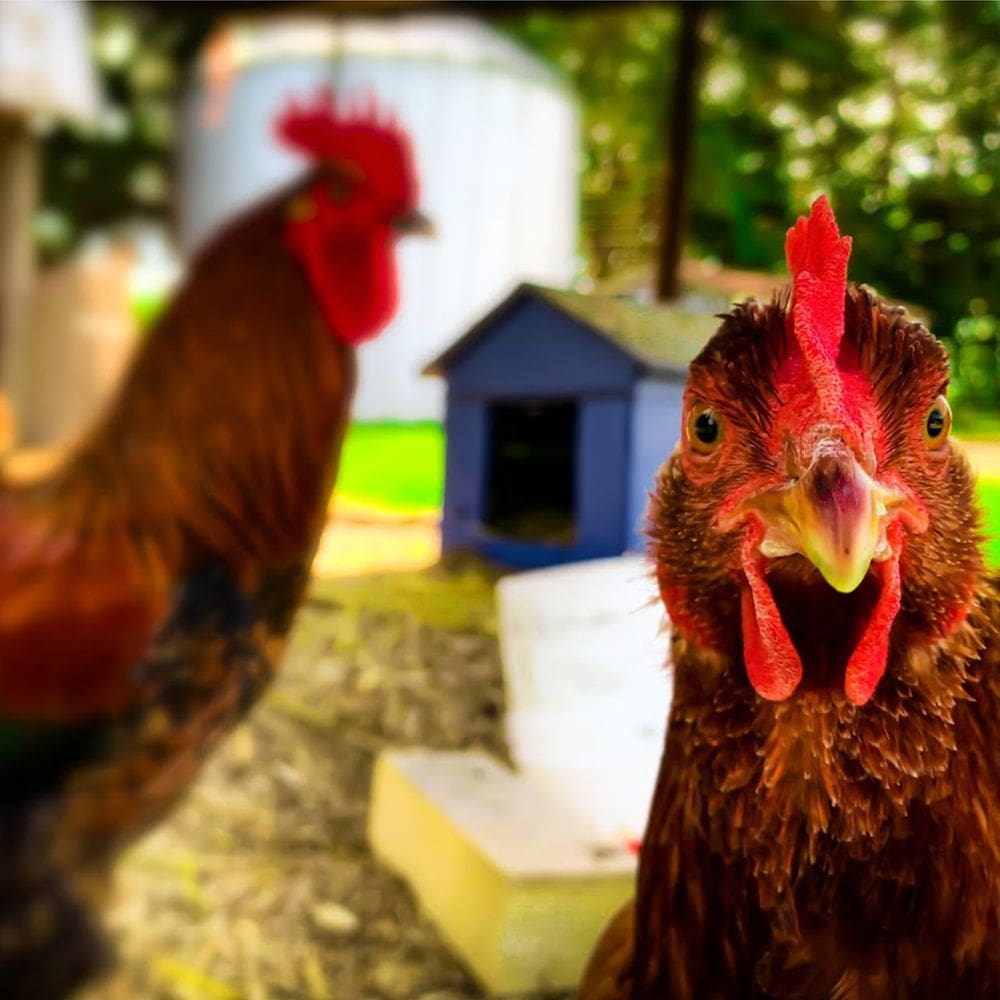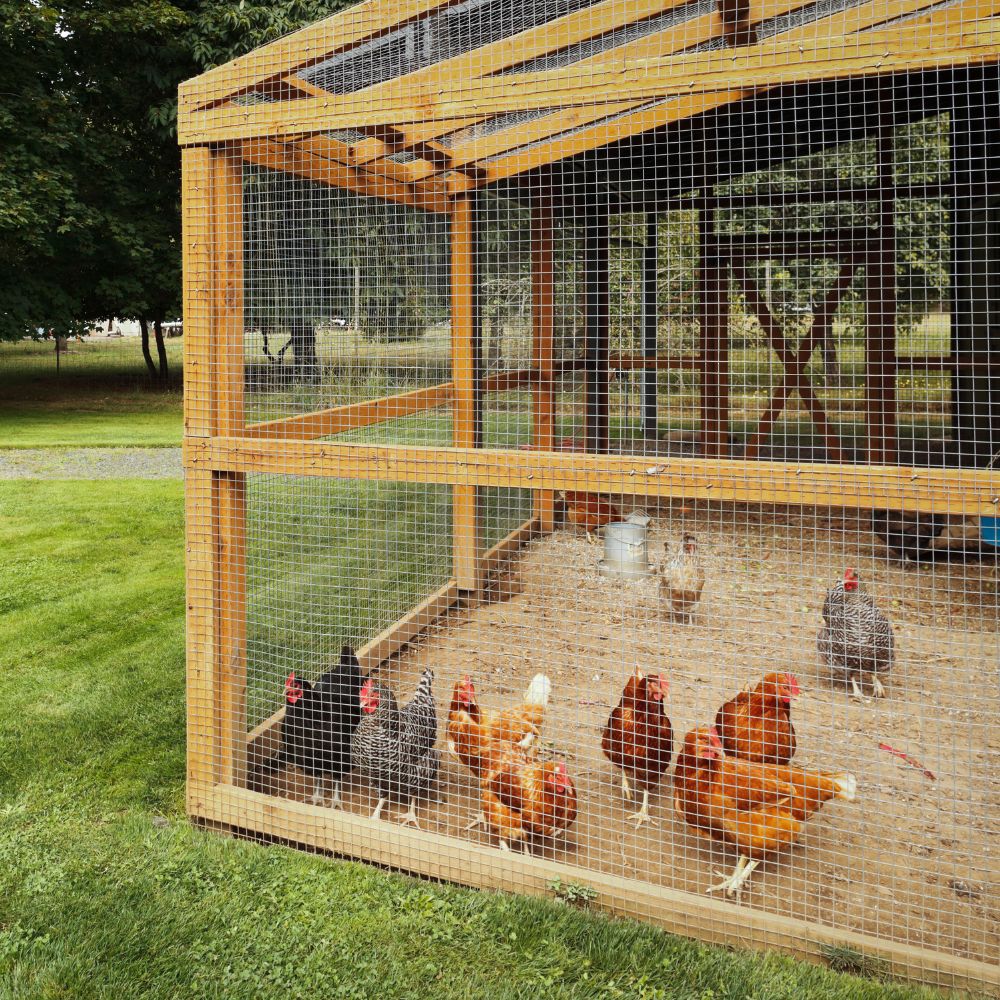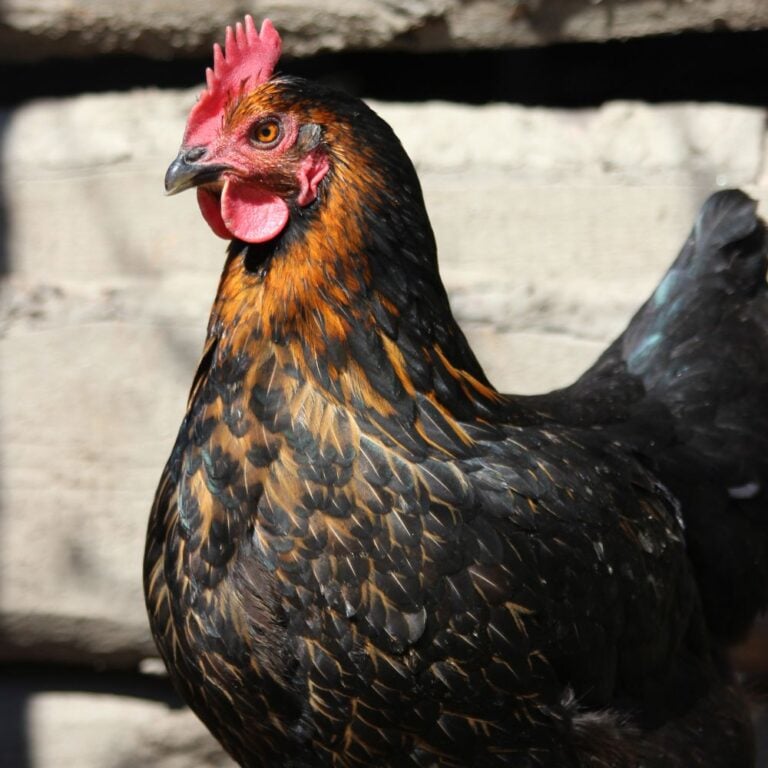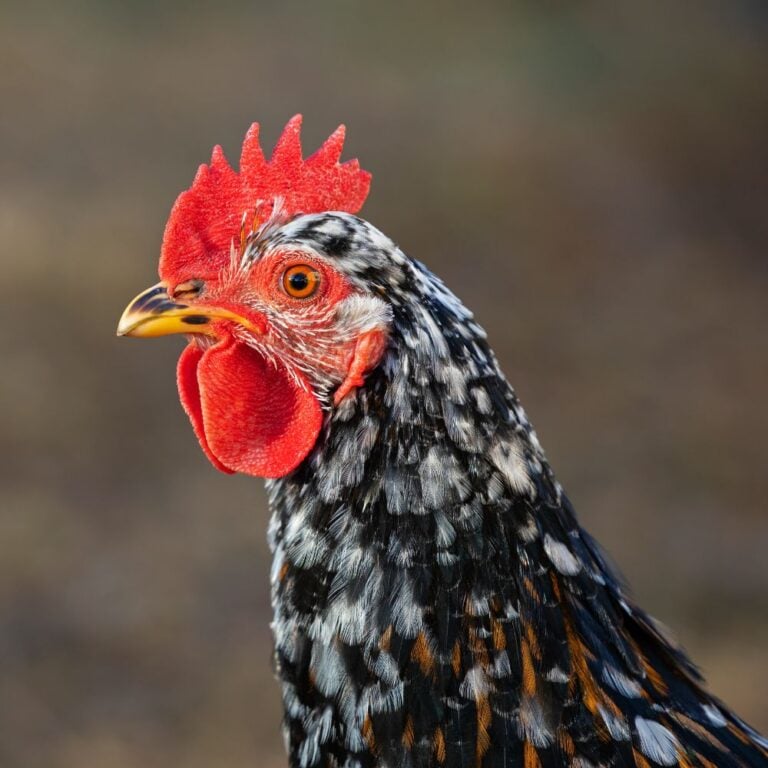Worried about coccidiosis in chickens? You’re not alone. This disease is one that leaves most chicken keepers quaking in their boots.
If your birds are affected with symptoms like bloody chicken droppings and are showing a failure to thrive, they might be affected by coccidiosis.
Similar to other kinds of external parasites, like lice and mites, this intestinal disease is common in chickens but can be devastating to a flock, especially in younger chickens that haven’t developed effective immunity against the many species of coccidia. The good news is that there is treatment available.

Table of Contents (Quickly Jump To Information)
What Is Coccidiosis in Chickens?
Coccidiosis is a disease caused by an intestinal protozoa, which is a type of intestinal parasite. When it enters the gut, the stomach acids break down the hard coating around the parasite, basically activating it.
Coccidia oocysts then invade the lining of the small intestine and can cause bleeding and prevent the intestines of poultry from absorbing nutrients properly. Coccidia can then be spread in your chicken’s feces, going on to affect other chickens in your flock.
Coccidiosis is more likely to affect chickens who are suffering from stress or other conditions, like anemia. Fortunately, there are measures you can take to guard against this disease in broiler chickens and egg-laying chickens alike.
Symptoms and Signs of Coccidiosis
Intestinal coccidiosis can affect a single chicken or a flock of chickens quite quickly, as the incubation period is only a few days.
Depending on the chicken and the level of infection (a few organisms or many), as well as the types of coccidia that have infected your birds, symptoms of coccidiosis can appear over many days or occur suddenly. There are even cases of a chicken looking perfectly normal on one day and then being dead the next.
The most common sign of intestinal coccidiosis is blood in your chicken’s droppings, but you don’t want to get this confused with cecal chicken droppings, which can be a reddish color. If there’s any question, your veterinarian can examine the stool, performing a diagnostic test called a fecal floatation, which can identify coccidia oocysts.
Other symptoms and clinical signs of coccidia include:
- Ruffled feathers
- Weight loss
- Diarrhea
- Blood in droppings
- Loss of appetite
- Listlessness and lethargic appearance
- Pale comb and/or skin
These symptoms can occur at the same time as or instead of blood in the stool.
How Long Does it Take a Chicken to Recover From Coccidiosis?
Coccidia has a comparatively long life cycle and can cause serious damage to the intestinal lining and overall health of your chickens. It can take a month or more for your chickens to fully recover, even with medication and supplements.
On average, most chicken keepers report that it takes an infected bird a minimum of ten to fourteen days for the treatment of coccidiosis to have an effect. It can take several weeks after that for paleness, depression, and other clinical signs of the disease to improve.
Can Coccidia Go Away On Its Own?
With proper flock management, you might wonder whether an outbreak of coccidiosis can go away on its own. While you can certainly prevent an outbreak with techniques like keeping coops clean and providing fresh litter material, you will usually need anticoccidial drugs to fully get rid of this disease.
Does Coccidiosis Kill Chickens?
Interestingly, some chickens have a natural immunity to certain strains of coccidia. This can often help keep them safe or suffer only minor symptoms from an outbreak or spread of disease.
However, high levels of coccidia can lead to death, as can an unchecked, untreated outbreak. Even a minor outbreak can stunt the growth rate of your birds, so do your best to prevent and treat this disease as soon as it arises.
Can You Eat Eggs if Chickens Have Coccidiosis?
When it comes to eating eggs from chickens infected with coccidiosis, it’s important to note that it’s perfectly safe for humans to eat eggs from chickens with coccidiosis – but not necessarily eggs from chickens who have been treated with anticoccidial drugs.
Most of these medications have a significant withdrawal period for meat and eggs, so be sure to check the label on the medicine you choose to use.
Treating Coccidiosis in Chickens
Medications
The good news about coccidiosis treatment is that it is available over the counter. You should isolate sick chickens from the rest of the flock to help minimize their spread. It will also prevent the healthy birds from picking on the infected bird. As far as treatment goes, all of your birds need to be treated to ensure that you clear up the problem.
Amprolium is a commonly used anticoccidial treatment, also referred to as a coccidiostatic medication. It doesn’t kill the coccidia but blocks the coccidia’s ability to multiply and cause further health issues. The medication is often added to your chickens’ drinking water supply, but you may need to give it orally to sick chickens that aren’t drinking or eating much to ensure they get an effective dose of the medication.
Anticoccidial treatment goes on for several days, usually seven. You may also need to give a vitamin B supplement to your birds after treatment, as the medication can affect their ability to metabolize vitamin B. This can also reduce the likelihood of other problems, like anemia.
Create the Ideal Environment for Recovery
When you are treating coccidia with anticoccidial medication, you also want to make sure that your chickens’ living space is cleaned up. Clean the coop thoroughly and wash all feeders and nipple drinkers to help minimize the possibility of transmission. Providing clean waterers and feeders, may also increase your birds’ water consumption.
You will want to ensure that these areas are clean and dry, as the protozoa thrive in warm, moist environments. Get rid of damp bedding and practice good biosecurity at all times.
If the area you keep your chickens in is damp or particularly humid, consider a second course of treatment to make sure that treatment is fully effective.
Limit overcrowding both in the chicken coop and chicken yard, too. Chickens need a minimum of eight square feet of space in the run, or more if the coop is small.
Watch Egg Production
Most chickens that are actively infected with coccidia will have decreased egg production or stop laying eggs altogether. While the medication has zero egg withdrawal time in most countries, you should consult with your veterinarian about whether the eggs should be eaten or not.
Unfortunately, some young chickens develop intestinal scarring and fibrosis when they have chronic coccidiosis, which can result in them not absorbing nutrients from their food very effectively. These chickens are often poor egg layers as they develop.
Make sure you’re providing your chickens with the nutrition they need to get through this rough patch. A high-protein, high-calorie diet with a few extra treats (like these tasty mealworms!) might be necessary for a while.

Preventing Coccidiosis
Coccidiosis is easily spread in chickens, as it is transmitted through the stool. It can be passed from chicken to chicken via contaminated water or food. You might even inadvertently pass it to your chickens from contaminated tools like shovels or the bottom of your shoes. These are reasons proper cleaning procedures and quarantine should be maintained especially when new chickens are brought onto a property.
While most healthy chickens develop an immunity to coccidiosis over time, they will only build up the immunity to the strain they are exposed to. If they get exposed to another strain, such as if you bring in chickens affected with a different strain of coccidiosis, it is possible for your chickens to get sick, even if they have overcome an infection previously.
If you have chickens that keep getting coccidiosis, you should work with your veterinarian to try and identify a cause. Poor housing conditions or an underlying health condition may be to blame.
Medication
Medications such as amprolium can be given to treat or prevent widespread coccidiosis infections within your flock, but using the medications too often can lead to resistant coccidia that is not treatable with medication.
When you get chicks, check to see if they have been vaccinated for coccidiosis, although this is not always helpful as the chickens will only be protected against the strain they are vaccinated against. You might also consider a medicated starter feed. Don’t use this if you have chicks that have been vaccinated, as it can cancel out the vaccine they received.
However, as members of the Chicken Vet Corner group note, starting chicks with medicated feed can be beneficial in preventing coccidiosis.
I always start my chicks out with a medicated feed. I buy a big 40lb/50lb bag and by the time I am done with it they are ready for the outdoors and I can start them on a pellet instead of crumble.
Jyl Bailey
Corid oral solution is another treatment you can use. This is added to the water at a ratio of two teaspoons per gallon, with seven days of treatment followed by seven days off. Some people use it as a preventative measure, while others wait until an issue pops up to do so.
When giving medication, you may need to work harder to get your birds to drink their water or to eat. One member of the Chicken Vet Corner group suggests:
Add sugar to Corid water to encourage drinking. About 2 TBSP per gallon
Allison Claire Doty
Housing
Housing management is the best course of action for helping to prevent coccidiosis. Keep the environment clean and disinfect regularly. Make sure your chickens’ dishes are kept clean. Also, don’t just toss food on the ground. Doing that will make it easier for your chickens to become infected with coccidia.
Not only that, but food tossed willy-nilly on the ground can attract both insects and wild birds – both of whom can spread coccidiosis.
You should also ensure that your chickens have plenty of space. Each chicken needs a minimum of four square feet in its coop to do well. Overcrowding your chickens is a recipe for disaster and can ensure the disease spreads quickly through the coop.
If your area gets deep freezes, that’s a great way to kill off coccidia. Unfortunately, many areas around the world feature periods of humidity and wet weather, where the coccidia thrives.
Looking to freshen up your nesting boxes – and help keep pests and other diseases out? You may want to add some of these awesome nesting herbs for a healthy coop.
Do your best to ensure your feeders and waterers are protected and secure to prevent the spillage and reduce litter moisture. These steps can go a long way to keep the coop and chicken yard free from disease!
Talk to a Veterinarian
Take time to talk to your veterinarian, or at least a knowledgeable chicken keeper, before using mediations. Many strains of coccidia are easily confused with other diseases, like necrotic enteritis. The common symptoms are similar (including bloody diarrhea).
To find the right treatment for coccidiosis in your flock, you’ll want to talk to a professional who can give you a definitive diagnosis and the best directions to control a coccidiosis outbreak in your flock.
In Summary
Coccidiosis is a common chicken parasite that can be devastating to a flock. One of the most common signs is bloody stool. While treatment is available over the counter, you should check with your veterinarian to help get a diagnosis.
Related Articles
- Chicken Feed 101 for New Owners
- Are My Chicks Hens Or Roosters?
- When Do Chicks Roost?
- When Will Chicks Start Laying Eggs?
- Chicken Parasites – An Informative Guide to Uninvited Guests
Maat van Uitert is a backyard chicken and sustainable living expert. She is also the author of Chickens: Naturally Raising A Sustainable Flock, which was a best seller in it’s Amazon category. Maat has been featured on NBC, CBS, AOL Finance, Community Chickens, the Huffington Post, Chickens magazine, Backyard Poultry, and Countryside Magazine. She lives on her farm in Southeast Missouri with her husband, two children, and about a million chickens and ducks. You can follow Maat on Facebook here and Instagram here.



![5 Edibles You Can Feed Your Chickens For Great Tasting Eggs! [Podcast]](https://thefrugalchicken.com/wp-content/uploads/2017/01/what-to-feed-chickens-for-great-tasting-eggs.jpg)

![Fall In Love With Feeding Pumpkins To Your Chickens + Fall Coop Spray Recipe! [Podcast]](https://thefrugalchicken.com/wp-content/uploads/2018/08/chickens-and-pumpkins-min.jpg)
I use the deep litter method and my 6 chickens are healthy and thriving. I rake the poop on top to the bottom and move fresh straw around onto the top. My coop doesn’t smell, is very warm and well ventilated. I plan on raking it all out in the spring and replacing it with sand for the warm summer.